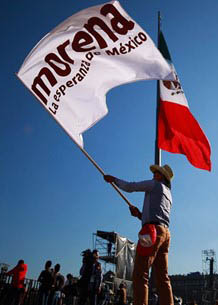|
|
|
|
The weekly newsletter of the México Solidarity Project |
|
|
|
June 30, 2021/ This week's issue/ Meizhu Lui, for the editorial team |
|
|
Just Part Way Through the Party |
|
The party starts out with excitement and enthusiasm as the crowd starts building. But part way through, the energy starts flagging. It’s not clear whether folks are coming or going.
In our interview this issue, Agustin Arreola talks about the excitement and enthusiasm he felt when Morena — the new progressive Mexican political party founded in 2014 — exploded onto the national scene, promising to prioritize the needs of the poor and the marginalized. Could the “Mexican dream” finally be coming true?
In pursuit of that dream — also the theme of the film we feature this week in Reflections — Arreola returned to his Mexican hometown of Jalisco from San Diego to become a Morena activist. But dreams, particularly utopian dreams, tend to butt up against reality when the lights go on. Arreola found in Jalisco a Morena organization that acted more like the corrupt parties of the past than an expression of greater democracy.
Disappointing? Yes, but the party isn’t over. Agustin and others like him aren’t walking out the door. They’re staying, to revive flagging spirits and to encourage new people to come in and revitalize the party. They understand that we need our utopian dreams, a vision to help us strive ahead through thick and thin.
Our spirits aren’t flagging here at the México Solidarity Bulletin. Our sense of solidarity with folks struggling for the “Mexican dream” remains solid, not dream-like ephemeral. We’ll be taking a break the next two weeks to finally visit family and friends. But we’ll be back in your email inbox July 21. Please keep the party going while we’re gone! |
|
|
Agustin Arreola, a life-long political activist, has been an organizer and a go-to person for those in the Mexicano community needing help, whether in México or in San Diego, where he lived for several decades. He’s now living again in Jalisco, immersed in the politics of his hometown.
How did you first get politically involved?
México has always welcomed refugees from other countries. At the university I attended in Baja, I had the good fortune to meet and learn from political refugees from Argentina, Chile, and elsewhere. Their critical attitudes and experiences in so-called “democratic” capitalist countries turned me into an activist. |
|
|
You lived many years in the United States. Did you leave México to pursue the “American dream”?
I went to the US when I was 29 because I needed to make some money — and planned to go home after I had saved enough. I was legal, and my US-born children were pushing me to become a citizen. But I never applied. I didn’t want to give up my Mexican citizenship, my Mexican identity, and I knew we Mexicanos would never be treated equal to white citizens. My dream was to go home! And I finally did.
You wanted to organize support for Morena. How did you find the local situation?
I became really excited in 2018 when AMLO and Morena were elected. I wanted to help them win again in the midterm elections on June 6. After 2018, the common people of Jamay, my town in the state of Jalisco, seemed more open to change, and I thought I could convince more people to become Morena supporters.
But it didn’t turn out that way. When AMLO ran for President, he was practical. He built a united front that included not just the left, but the center, and even some from the right. In Jalisco, a conservative state, the caciques — political bosses who had been PRI and PAN officials — agreed to support AMLO in 2018. They wanted a favor in return: control of their local area. |
|
For this year’s elections, Morena was supposed to have elections to decide who the party’s candidates for federal, state, and local offices would be. That didn’t happen. A day before the deadline to choose, my group of organizers got a call from the Morena leadership, telling us that they had the candidates already chosen. That leadership now includes some local caciques, but the Morena state election committee was part of this decision too. Their candidate for deputado — member of Congress — had not been a Morenista and wasn’t anyone we knew. We were shocked! We said no, we can't go along with that. After that, we never heard from them again.
So did you quit doing electoral work? |
|
|
The choice was to do nothing, or join the PT — Partido de Trabajadores, the Workers’ Party, which I did. I really don’t like the PT. On paper the party has good principles, but it doesn’t work among the people. Still, it’s part of the Morena coalition.
Sounds like “business as usual” in Jalisco’s elections.
Unfortunately, yes. And the politicians are using the old tools of corruption: bribes, extra ballots in the box.
And then there are the cartels. Local PRI officials had deals with them, sometimes getting the cartels to do their dirty work. Those who oppose the political bosses face intimidation and worse. I know I am going to have to watch my back.
After this experience, do you still support Morena? What is your “Mexican dream”?
Old habits and power structures never beak easy, especially when those habits and power structures have cartels enforcing their line. Our goal now: to recover Morena for the people. The party needs to improve its internal democracy and to encourage its members to participate. People are mad about what happened in Jalisco — and they’re ready to organize! I remain a Morena supporter. It is still our best hope to break the power of the elites and have a government for the little people.
But we don’t build people’s power just through elections. I’m helping start an organization to provide assistance to workers and small businesses and a program for youth to develop their political skills. The main thing? To seed hope, to provide tools for change.
My dream, and the dream of most Mexicans, remains a 4th transformation as promised by AMLO, where ordinary people can live comfortably and peacefully and not have to leave home to work in the US. The American dream is about individual success. The Mexican dream is about the success of the whole country. I want to add my grain of sand for México’s future. |
|
|
|
Searching for Authenticity in the Film ‘La Marea’ |
|
Jimmy Centeno, a founding member of Philosophies of Liberation Encuentros, has been an independent art curator, writer, welder, and artist. We excerpt here from his CounterPunch review of the film La Marea/Corriente. |
|
La Marea/Corriente (Wave/Current 2020) is filmmaker Miguel Novelo’s counter narrative to the American dream… The film carries a youthful layer of optimism with a subtle dialectic framework between the Mexican filmmaker who immigrated to the United States and his co-national who decides to pursue the Mexican dream. The main protagonist, Jorge, affirms his place of dwelling in the world distant from the major metropolises of México and the global North…
The documentary has the quality reminiscent of the advice that renowned Revolutionary Cuban filmmaker Humberto Solas, founder of the first Cine Pobre Film Festival in 2003, shares with filmmakers. He says, “film life, go film the children, the beach, the sea…” La Marea falls under the same spell/spirit expressed by Solas. Its visual presentation takes the viewer through the unspoiled happiness from/through the shadow of an encroaching (terrorizing) adverse effect of the fanatic politics of neoliberalism on all life…
Jorge’s wish is to become an animal caretaker rather than continue the family tradition of fishermen and divers. His friends ask Jorge why he is not following in the footsteps of his father and grandfather. Jorge, a musician who plays the guitar, seems to have chosen to spend his youth in activities that do not carry the weight of a corporatist’s spirit by extending/nurturing his caring sensibility to creatures dear to him and not be at the mercy of the market as an objectified/alienated laborer. One step towards the north away from his nonurban town with ways of being not quite diluted is one step less for Jorge’s preservation of his particular being. As minute as it might be, it is one less human empowering the control and domination of the U.S dollar over all aspects of Mexico’s economy, as well as its cultural and political identity…
La Marea’s narrative is a utopia that belongs to all those who retain a spirit of youth and the will of life aimed at change and becoming today what we all want to collectively be tomorrow regardless of age. It is an attempt to rescue the liberating content in utopia. For utopia is more than a slogan of yes we can. It is mythic energy encapsulated within horizons of hope in human memory… Utopian theory must depart from the political lived reality. The closer theory is to the current political reality, the better equipped we are to understand our role in the world in community that is: el ser humano es el ser supremo para el ser humano in coexistence with nature. For there is no moment in human history without the company of utopias. |
|
|
Recent news reports and commentaries, from progressive and mainstream media,
Ryan Devereaux, A U.S.-México Pledge to End Disappearances Fails to Grapple With the Complicity of the State, Intercept. On a little-noticed outcome of Vice President Kamala Harris’s recent meeting with Mexican President Andrés Manuel López Obrador.
John Ackerman, Morena: recuperar la legalidad, La Jornada. El partido político Morena se encuentra hoy en un estado de total ilegalidad y ausencia de institucionalidad democrática. Ninguno de sus órganos internos funciona cabalmente de acuerdo con los estatutos del partido.
Jude Webber, Despite setbacks, Mexico City mayor sees no need to change direction, Financial Times. Claudia Sheinbaum: “Neoliberalism cannot return to Mexico — it did a lot of damage.”
Natalia Torres, Oaxaca Fisherwomen Organize to Protect Their Way of Life, NACLA. A fisherwomen's cooperative copes with the impacts of environmental degradation and governmental negligence.
AMLO habla de crear “nueva clase media” más fraterna y solidaria, SinEmbargo. López Obrador dijo que se busca que millones mejoren su vida, “y además que estén más conscientes y más politizados para que resistan campañas de manipulación.”
‘Amlo will keep on being Amlo’: Mexico’s president undeterred by bruising midterms, Financial Times. López Obrador’s unrelenting attacks on political enemies, including the rich, the media and the business class, have also fueled concerns about the risks of dividing an already deeply fractured society. |
|
|
The Mexico Solidarity Project brings together activists from various socialist and left organizations and individuals committed to worker and global justice who see the 2018 election of Andrés Manuel López Obrador as president of México as a watershed moment. AMLO and his progressive Morena party aim to end generations of corruption, impoverishment, and subservience to US interests. Our Project supports not just Morena, but all Mexicans struggling for basic rights, and opposes US efforts to undermine organizing and México’s national sovereignty.
Editorial committee: Meizhu Lui, Bruce Hobson, Bill Gallegos, Sam Pizzigati. We welcome your suggestions and feedback. Interested in getting involved? Drop us an email! |
|
|
|
Web page and application support for the México Solidarity Project from NOVA Web Development, a democratically run, worker-owned and operated cooperative focused on developing free software tools for progressive organizations. |








